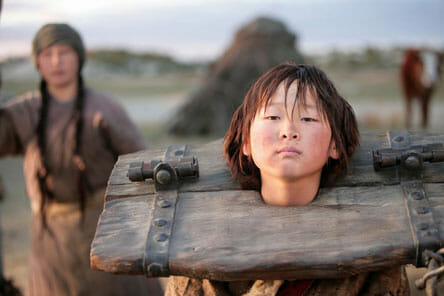Mongol

Release Date: June 6
Director: Sergei Bodrov
Writers: Arif Aliyev, Bodrov
Cinematographers: Rogier Stoffers and Sergei Trofimov
Starring: Tadanobu Asano, Honglei Sun, Khulan Chuluun, Odnyam Odsuren
Studio/Run Time: Sony Pictures Classics, 99 mins.
Khan isn’t complicated enough in visually attractive film
Thanks to their visual nature and simple stories, action epics travel well. Hollywood studios discovered decades ago that they could sell them worldwide, and in recent years foreign films have been reaching for a slice of the pie. Mongol—a new film from Russia, Mongolia and Kazakhstan—tells the story of Genghis Khan, from a child to de facto leader of the Mongol tribes, and although its production values are every bit as good as the American films it emulates, the movie is lessened by its need to conform to Hollywood’s formula for international success.
Whether your history class taught Khan as a menace or a hero probably depends on whether your school was built among Khan’s footprints. Mongol sees him as a noble warrior and a generous, committed family man, who fought to unite the warring Mongol tribes under a code of honor. As with any action epic, the story may be rooted in history, but it exists mainly as a skeleton for spectacle, and the character of such a film—whether it’s King Leonidas from 300, Maximus Meridius from Gladiator or Genghis Khan from Mongol—is fashioned according to the needs of storytelling. In each case, the filmmakers benefit from a history that’s notably sketchy in the details.
-

-

-

-

-

-

-

-

-

-

-

-

-

-

-

-

-

-

-

-

-

-

-

-

-

-

-

-

-

-

-

-

-

-

-

-

-

-

-

-








































